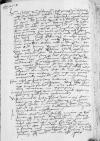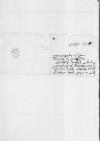Die XIII Februarii scripsi Reverendissimae Dominationi Vestrae recepisse me litteras suas in negotio sororii sui eximii domini ⌊Ioannis Reneck⌋ utriusque iuris doctoris etc. Egi negotium hoc apud ⌊serenissimam regiam maiestatem⌋, thesaurarium et alios, et quominus omnia ad vota succedant certe certe, nihil est quod impediat, quam pecuniarum penuria, quae tanta est, ut vix credi poterit, proceres tamen huius regni et alii incolae subvenient suae maiestati. Itaque deliberatum et mihi pro responso datum est, quod antequam ⌊regia sua maiestas⌋ hinc discedat, dabitur ordo et commissio, ut dicto domino ⌊Ioanni Reneck⌋ doctori fiat solutio. Ego tamen iussu ⌊cesareae maiestatis⌋ cogor hinc infra triduum abire et duces ⌊Bavariae⌋ accedere, ubi mansurus sum per tres septimanas vel circiter. Hic aut ⌊Viennae⌋ apud ⌊regiam maiestatem⌋ rediturus non praetermittam ea omnia tentare, quae negotio conveniant, donec optata impetravero. Dominus Loxanus a nuptiis nondum rediit. Cum primum ille redierit, dabo illi litteras ad eum directas aut mittam, illique imponam onus continuandi negotium per me inceptum.
Hic nihil penitus boni audimus. In ⌊Germania⌋ omnia sunt suspecta, nam ligae Suevicae tempus finitum est et, ut videtur, nolunt illam renovare aut prorogare.
Lantgravius hiis diebus fuit apud ⌊regem Francorum⌋. Quid fecerit, ignoramus.
Vespasianus de Zaza filius Ieronimi die tertia huius hic ad nos rediit ex ⌊Constantinopoli⌋. Dicit ⌊Ludovicum Griti⌋ brevi, hoc est in fine huius, ⌊Budam⌋ venturum. Quid boni attulerit, intelligemus.
In Italia dicitur multum de bello, maxime per ⌊regem Franciae⌋ et ⌊pontificem Romanum⌋ illaturum duci Urbinatensi et duci Mediolanensi. In hunc diem nihil attentatum est. Quid futurum sit, ignoramus. Fama est ⌊Turcam⌋ cum ⌊pontifice⌋ et ⌊Francorum rege⌋ intelligentiam habere et eodem tempore ⌊Regnum Neapolitanum⌋ et ⌊Ciciliam⌋ invasurum, quod tamen non ita esse spero.
Quid ⌊Gedanenses⌋ inter ⌊Hollandos⌋ et ⌊Lubicenses⌋ boni impetraverint, adhuc ignoramus hic. Ex parte serenissimae dominae ⌊Mariae Hungariae reginae⌋ missi sunt reverendissimus dominus ⌊Georgius ab Austria⌋ episcopus Brixiensis, ⌊Maximilianus Transilvanus⌋ et ⌊Gerardus Mulart⌋ doctor et conciliarius ⌊cesareae maiestatis⌋. Quid impetraverunt, videamus brevi.
Digniora non sunt apud nos, quae allata fuerint. In futurum, si Vestrae Reverendissimae Dominationi gratum fuerit, scribam aliquando. Et interim et semper Reverendissimae Dominationi Vestrae me ex integerrimo pectore commendo et ad quaevis obsequia paratissimum offero.


